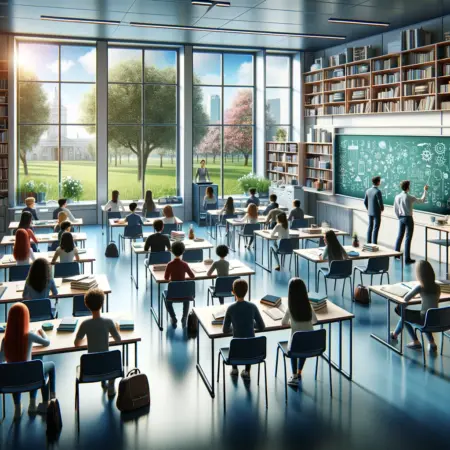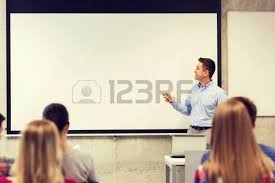The education and teaching in schools is very important aspect. It must also say that schools have become more selective in order to improve the quality of education especially in science, technology and computer science.

Education has been so much talked about in these days, that, as in the case of some other terms in common use, we are in danger of forgetting what it really should mean. Interpreted by its use in one direction it would seem to stand for little more than educational machinery—the provision of rooms, appliances, teachers, and so forth; from another side all it is apparently intended to express is the power on the part of children at school to reproduce a number of facts, and exhibit a certain mechanical skill in such instrumental branches as reading, writing, and arithmetic.
To the teacher education should mean neither of these things ; it is not mere knowledge, and its processes are not mechanical. The giving of information is the means, not the end ; the all-important thing, so far as the child is concerned, being how the knowledge is given and received.
The teacher, of all persons, should never forget that true education means growth, development—the acquisition of mental and moral strength ; and that to secure this the faculties of the child must be exercised in an intelligent and rational manner. Knowledge crammed into the mind, in such a way that it is not assimilated, is not power, but so much almost useless lumber.
It is possible for a man to be a kind of walking encyclopaedia and yet not be educated In any true or right sense. The exercise of the memory is important; but when it is the only faculty used, some of the most important sides of the mind are left dormant. If children are treated in this way in school, and they happen to grow up intelligent, their real education has been gained elsewhere, and it has gained in spite of the school, not by means of it.
The great difficulty is that while every teacher claims to know these things, the temptations to forget them in practice are so great, that it is to be feared that education in its true sense is making very little if any progress whatever. Nor is this to be wondered at so long as it is possible to gain credit by merely external and easily-tested results and the present nineteenth-century craze continues for estimating everything by statistics.
The child’s future welfare must be the first and great consideration in any true system of education, and not merely the passing of this or that examination. To Jcnow what is right and needed is not all; we must turn our knowledge into a living faith that issues in action and controls our practice.
From the teacher’s standpoint the theory of education includes everything which it is important for him to know bearing upon the training, Informing, and developing of the child. This knowledge has two sides :—
(1) The Art of education, which gives us all necessary rules and
directions how the work is to be performed ; that is, it is a description of all the best methods of teaching and of conducting every part of school work.
(2) The Science of Education, which gives us lue foundation truths
upon which the art of education must rest. It furnishes us with the laws which should govern our methods, and tells us why we should teach or train a child in a particular way.
It concerns itself with the growth of the child’s mind, and its modes of action ; it throws light upon the question as to what may be expected from a child at a certain age and what may not; in short it renders the art side of our work intelligent by interpreting our practice for us, and enabling us to judge of the correctness of our methods of procedure.
Both sides of educational theory are important, but the art ilde, at least in its main outlines, should be mut«rad Ant, as being much the easier and the one more directly bearing upon practice ; the (denes of education may be profitably brought in to test the correctness of our work at every point, and to enable us to make with succes* original departures in our teaching.
The Relationship Between Teacher And Education In Today’s World
It is sometimes urged that the teacher, like the poet, is born, not made. There is a sense, of course, in which this is true ; but too frequently it wears the look of an apology for ignorance. It does not mean that the teacher is not helped to an immense extent by theoretical information as to the best means of doing his work; but only that knowledge of the theory of education alone, no matter how complete, can never make a teacher. Practice and experience, in teaching, as in every other art, are essential things.
Experience truly is a good teacher, but as has been said, her school fees are apt to be very heavy. To neglect the theory of educational work because teaching is a practical matter is a fatal mistake, and the effects are not confined to the teacher, but are sure to act prejudicial on the methods he adopts, and so will be reflected upon the children under his charge.
Neglect of the art of education simply means that the teacher must at best blunder his way into success, laboriously correct his errors by the failure or the mischief produced, and slowly discover things for himself which others have discovered before him. It is to throw away all the advantages which the accumulated results of the wisdom, invention, and experience of those who have gone before should give us ; and such a doctrine, if generally adopted, would effectually prevent any further progress in the development of educational processes. From the waste of time and energy, and from the disheartening and disappointments necessarily attendant upon such a course, we may save ourselves if we will. Why should we thread the thorny path of error, or traverse the dreary swamps of failure, when a safer, pleasanter, and shorter path has been pointed out to us by those who have traveled the road before us ?
While, however, it is highly important that the teacher should know theoretically his work may best be performed, many other qualifications besides knowledge are necessary for success in school work.Some men, from their cold unsympathetic nature, impatient disposition, or dull heavy manner, are naturally unfitted to be teachers , others again fail from being almost entirely wanting in any natural power of controlling children ; while still others make school work a burden to themselves and their scholars because teaching is to them no more than an unpleasant necessity—merely a weary and toilsome mode of earning a living. There are comparatively few, however, who cannot by painstaking care and patient work learn to become sensible and useful teachers. The worlds work is not done by its men of genius.
Education plays a pivotal role in the development of individuals and societies, acting as a cornerstone for personal growth, societal progress, and global advancement. Its role in teaching extends beyond the mere transmission of knowledge; it encompasses the cultivation of critical thinking, the promotion of cultural understanding, and the nurturing of innate talents and abilities.
The Transmission of Knowledge
At its core, education is about the transmission of knowledge. It provides individuals with the necessary information and skills to navigate the world. This encompasses a wide range of subjects, from the basic reading, writing, and arithmetic to more complex subjects like science, history, and technology. The foundational knowledge acquired through education enables individuals to understand and interact with the world around them, making informed decisions and contributing to their communities.
Cultivation of Critical Thinking
Education goes beyond rote learning; it is instrumental in cultivating critical thinking skills. Critical thinking involves analyzing information, questioning assumptions, and evaluating evidence. Through education, individuals learn to approach problems systematically, consider multiple perspectives, and make reasoned decisions. This skill is invaluable not only in academic pursuits but in everyday life, enabling individuals to navigate challenges, solve problems, and engage in informed debates.
Promotion of Cultural Understanding and Social Cohesion
Education plays a crucial role in promoting cultural understanding and social cohesion. By exposing students to diverse cultures, histories, and perspectives, education fosters an appreciation for diversity and promotes empathy. It helps individuals recognize commonalities among different peoples, reducing prejudices and promoting harmony. In a globalized world, such understanding is critical for peace, cooperation, and progress.
Nurturing Talents and Abilities
Education is not just about academic achievement; it also plays a crucial role in identifying and nurturing individual talents and abilities. Whether it’s in the arts, sports, sciences, or any other field, education provides opportunities for individuals to discover and develop their interests and strengths. This personal development aspect of education is essential for creating well-rounded individuals who can contribute to society in various ways.
Adaptation to a Changing World
In today’s rapidly changing world, the role of education in teaching is also about preparing individuals to adapt and thrive in the face of new challenges. This includes teaching digital literacy, environmental stewardship, and global citizenship. Education equips individuals with the flexibility and resilience needed to navigate technological advancements, environmental changes, and shifting global dynamics.
Conclusion
Education and its role in teaching are crucial for the development of individuals and societies. It empowers students, bridges the gap between theory and practice, cultivates lifelong learning, and promotes social and economic development. By investing in education, we invest in the future, creating a world where individuals are equipped with the knowledge and skills to drive positive change. Let us recognize the significant role of education in teaching and work towards providing quality education to all, ensuring a better and more inclusive future for generations to come
